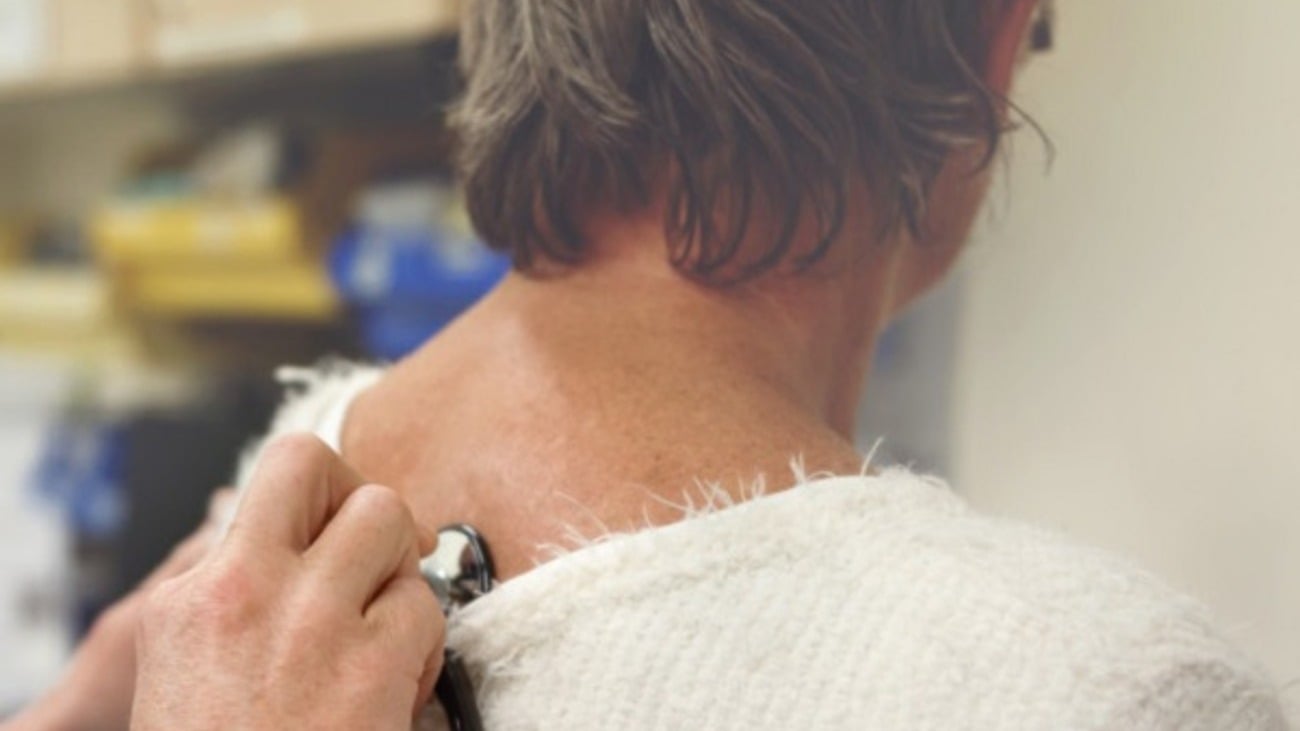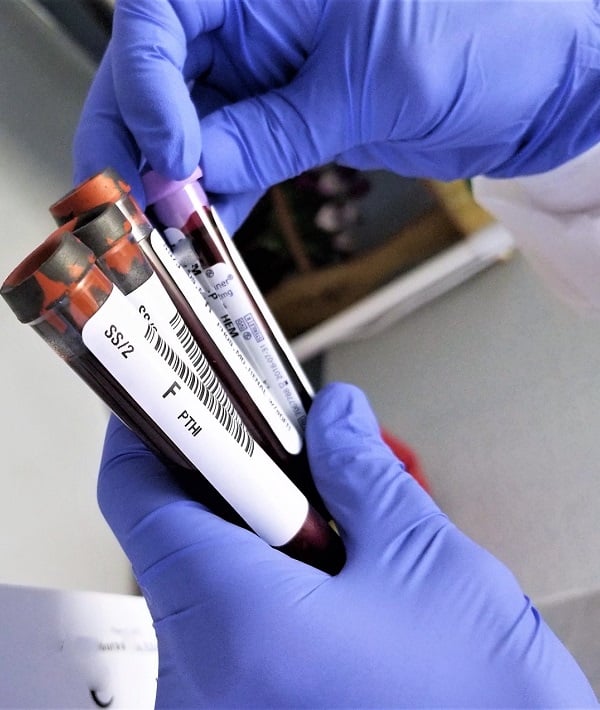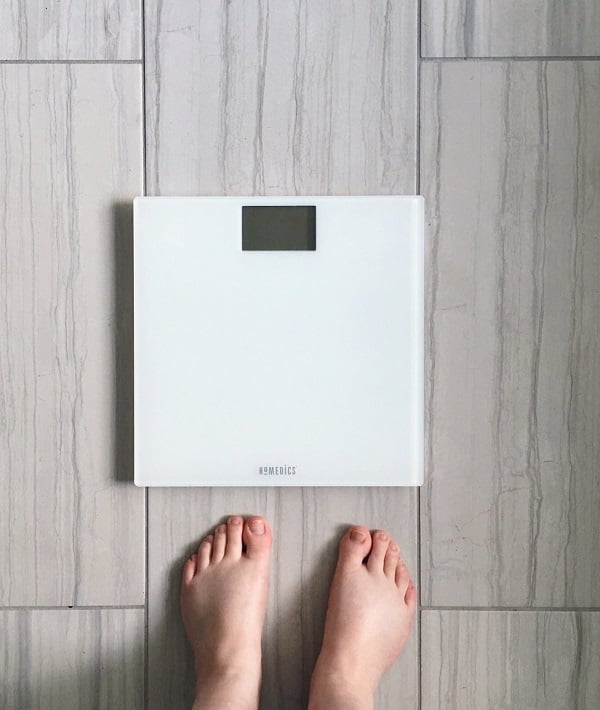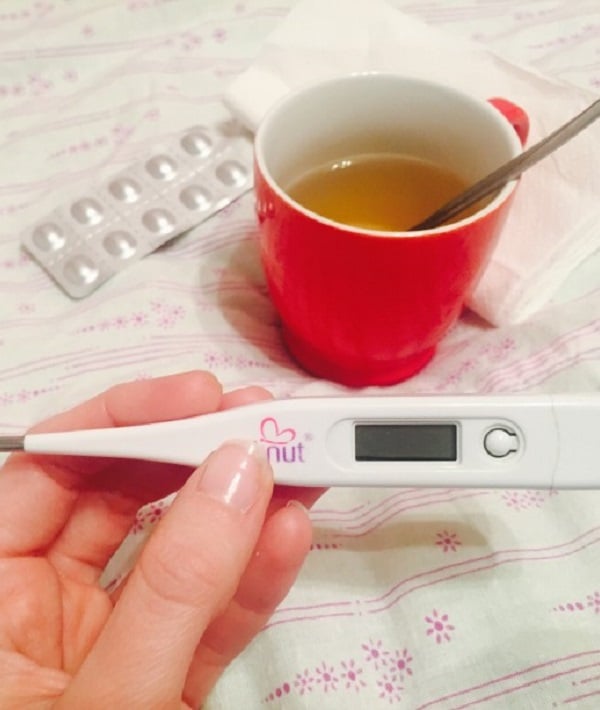
According to the American Cancer Society, an estimated 606,880 people in the United States will die from cancer in 2019. What's even more devastating is that between 30% to 50% of cancer cases are likely preventable. Keep reading to find the 20 most common signs and symptoms of various types of cancer.
Persistent Cough

Do you have a cough that's lingered for a month or longer? It's time to schedule an appointment with your doctor. One of the most common symptoms of lung cancer is a persistent, nagging cough. The American Cancer Society estimates that in 2019, there will be more than 228,000 new cases of lung and bronchus cancer in the U.S. — with more than 142,000 of those patients losing their life to the disease. Don't be a statistic. When caught early, this cancer has a high rate of remission.
Change in Bowel Movements

No one likes to talk about their poop, we get it, but taking note of your defecation is an important window into your overall health. Colorectal cancer may lead to a change in bowel movements, including diarrhea, pencil-thin stools or even constipation. Also important to note: If you have a bowel movement but don't feel a sense of relief, or spot blood in your stool, it's time to make an appointment with your doctor.
Anemia

Researchers have discovered that there's an unsettling link to increased cancer risk and iron-deficiency anemia. While there is still no clear understanding as to why, one theory suggests that an alteration to "immune activities" caused by iron deficiency may be to blame. Cancer risk for anemic patients includes pancreatic, kidney, liver and bladder cancers. If you've been diagnosed with anemia, talk to your doctor about your potential cancer risk.
Breast Changes

Even though breast cancer is one of the most recognized forms of cancer in the U.S., it's also one of the most prevalent. In 2019, the American Cancer Society estimates that more than 271,000 new cases of breast cancer will be diagnosed and of those patients, 42,260 will die. Recognizing the symptoms, which include breast lumps, nipple discharge and a change in breast texture, are important steps to early detection and a higher survival rate.
Testicle Changes

Like breasts, a man's testes are susceptible to changes caused by cancer. While the American Cancer Society projects there will be 9,560 cases of testicular cancer in 2019, the survival rate is incredibly high, with a five-year survival rate of approximately 95%. Men should look for unusual or new lumps as well as a feeling of heaviness in the testes. In addition to monthly self-checks, it is important for men to have an annual health screening.
Difficulty Urinating

Another cancer symptom that men in particular need to look out for is difficulty urinating. If men are experiencing a delayed stream or their urination is interrupted by stops, it's time to call the doctor. As a known symptom of prostate cancer, it's important that men get checked out as soon as possible, since early detection is linked to a five-year survival rate of nearly 100%.
Hoarseness

Notice that your voice seems more raspy or hoarse than usual? Call the doctor. A common symptom of throat cancer (pharynx, larynx and tonsils) is hoarseness. Men are more than four times as likely as women to die from throat cancer, and if caught early, patients have an approximate 59% survival rate in the first five years.
Lumps and Bumps

While most people know to look out for lumps in the breasts and testes, many don't realize that other foreign lumps on their body also need to be evaluated by a medical professional. Lymphomas (cancer of the lymph nodes) are known to cause lumps in the neck, groin or underarm. Other cancers, like soft tissue sarcomas, can cause lumps in places like the arms, legs or abdomen. When in doubt, let the doctor check you out!
Skin Changes

Most people know that if they have a mole that changes in size, color or shape (indicative of melanoma), they need to call a doctor. But did you also know that other forms of skin cancer, like basal cell carcinomas and squamous cell carcinomas, begin as raised patches on the skin? Pay attention to rough lumps or waxy raised spots that don't heal, as they could be early signs of skin cancer.
Indigestion

If you're regularly experiencing indigestion, heartburn, nausea, stomach pain or a feeling of fullness, it's important to make an appointment with your doctor. Stomach and pancreatic cancer both share these common symptoms that many patients mistake for a stomach virus or other digestive ailment.
Difficulty Swallowing

Also known as dysphagia, trouble swallowing is nothing to dismiss. This condition could be a symptom of esophageal cancer. Even if swallowing food and drink is only mildly uncomfortable, it's important to have a medical professional evaluate you to rule out a more serious cause. The American Cancer Society predicts that more than 17,000 patients will be diagnosed with esophageal cancer and an alarmingly high 16,080 could die from the disease in 2019 alone.
Abnormal Vaginal Bleeding or Discharge

Any abnormal vaginal bleeding or discharge needs to be addressed with a doctor. Bleeding between periods could by a symptom of endometrial, cervical or uterine cancer. Discharge that is thin, watery, pale, brown and/or has a noticeable odor should also be reported to your physician. While other medical problems (like hormonal imbalances and infections) can also cause these symptoms, it's important to be certain these aren't early indicators of reproductive cancers.
Unexpected Weight Changes

If you've lost (or gained) a significant amount of weight without any known reason, it's time to contact your doctor. Weight loss of 10 pounds or more could be a symptom of pancreatic, stomach, esophageal or lung cancers. Weight gain in women, on the other hand, may be a sign of ovarian cancer. Either change in weight needs to be evaluated by a medical professional.
Night Sweats

If you're soaking your sheets at night, don't chalk it up to a hormonal imbalance. For some people, excessive nighttime sweating could be a warning sign of several types of cancer, including leukemia, lymphoma, bone and liver cancer. While researchers aren't sure why these cancers cause increased night sweating, some believe it's due to an increase in the immune response. Either way, it's important to raise this issue with your doctor.
Fever

Fevers are the body's defense mechanism against foreign invaders. If you've experienced a long-lasting fever, it's important to see your doctor. While many types of cancer can cause a fever (especially if the cancer has spread), fever is also an early warning sign for specific cancers like leukemia and lymphoma. Even if cancer isn't to blame, a chronic fever is definitely something your doctor needs to know about.
Anal Itching

There are many reasons someone can experience an itchy anus, including irritation, infection, hemorrhoids, fissures, psoriasis and even cancer. If you find you're having the urge to scratch your nether regions more often than normal, make an appointment with your doctor. If anal itching is also accompanied by rectal bleeding, pain or a change in bowel movements, colorectal cancer could be to blame.
Wounds That Aren't Healing

If you've got a wound that just won't heal, make an appointment with your doctor (or better yet, a dermatologist). Basal and squamous cell carcinomas (skin cancers) both cause open sores that won't go away. While there are many other causes for non-healing wounds (like diabetes, skin ulcers and more), it's important to get treatment quickly to prevent further infection.
Pain

Repeat after us: Pain is not normal. If you're experiencing chronic pain, make an appointment with your doctor. Symptoms like headaches, back pain or generalized body pain could be a symptom of bone, brain, colorectal, ovarian or other cancers. Even if cancer's not the culprit, it's not normal or healthy for anyone to live in pain. See a doctor immediately!
Fatigue

If you can't seem to find the energy to handle normal, everyday tasks, it's important to see your doctor. Chronic fatigue is a common symptom of many types of cancer as well as many chronic ailments, including stress, anxiety, depression and more. If you're tired more often than not, it's worth a trip to the doctor to make sure there's not a more serious underlying condition.
Bloating

Both ovarian and stomach cancers often present as bloating, a symptom many women are apt to ignore. If you experience unexplained bloating (not related to your monthly cycle), it's important to discuss it with your doctor. Approximately 14,000 women will die in 2019 from ovarian cancer, and more than 11,000 men and women (combined) will die from stomach cancer, making awareness of their symptoms even more important.




